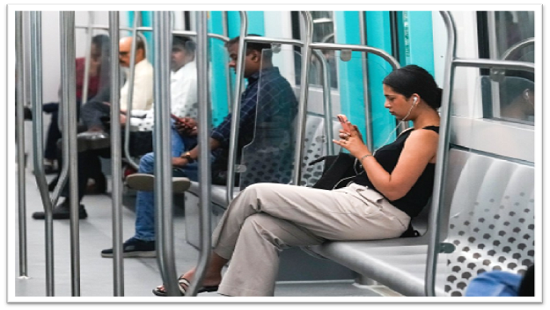
Mumbai Metro 3 Rolls Out Free WiFi Across All Stations — A Step Toward Smarter Urban Mobility
In a city where every minute counts, Mumbai Metro-3’s latest initiative promises to make commutes smoother and more connected. The newly launched free WiFi service, available across all 27 stations from Aarey to Cuffe Parade, marks another milestone in Mumbai’s journey toward a seamless, digitally integrated transport network.
The underground corridor, operated by the Mumbai Metro Rail Corporation (MMRC), was recently inaugurated to great public enthusiasm. However, many commuters soon reported poor mobile connectivity along the 33.5 km stretch — understandable, given that it’s Mumbai’s first fully underground metro line. In a quick and commendable response, MMRC has introduced free WiFi for passengers, bridging the digital gap and enhancing the overall commuter experience.
A Network That Keeps You Connected — Above and Below Ground
With stations stretching across key areas such as Churchgate, CSMT, Dadar, BKC, Santacruz, and both domestic and international airports, Metro-3 is fast becoming a vital transport spine for Mumbai. Offering free WiFi at every station is not just a convenience — it’s a statement of intent. The initiative underscores MMRC’s commitment to smart mobility, blending infrastructure, accessibility, and technology.
The new service aims to resolve two key challenges: ensuring uninterrupted connectivity for passengers underground and encouraging digital adoption through MMRC’s new ‘MetroConnect3’ app. By promoting app-based ticketing, MMRC is aligning with the city’s broader digital ecosystem — a move that saves time, reduces queues, and supports the government’s vision of a cashless public transport experience.
Why Free WiFi Matters in Urban Transit
Globally, metro networks in cities like London, Singapore, and Seoul have integrated free WiFi as a standard offering — a feature that not only improves commuter satisfaction but also facilitates smoother digital payments and service updates. For Mumbai, this rollout arrives at a crucial time as daily ridership grows and commuters increasingly depend on online navigation, payment, and entertainment tools.
According to industry estimates, Mumbai Metro-3 is expected to serve over 17 lakh passengers daily once fully operational. For such a massive user base, reliable digital connectivity becomes more than a luxury — it’s a public necessity.
By providing free WiFi, MMRC enhances digital inclusivity, ensuring that even those with limited mobile data access can stay connected during travel. This small yet significant step contributes to building a “connected city,” where every citizen can access real-time information — from train schedules to last-mile options — at their fingertips.
How to Connect: A Simple 3-Step Guide
Commuters can access the free WiFi easily through the ‘MetroConnect3’ app. Here’s how:
1. Download and log in to the ‘MetroConnect3’ app before entering the station (QR codes for download are available on-site).
2. Open WiFi settings and select the MetroConnect3 network.
3. Go to your app profile, tap ‘Connect to Wi-Fi,’ and enjoy high-speed internet access — including Wi-Fi calling, WhatsApp, and browsing.
The service is currently available at the concourse level near ticket counters, allowing passengers to connect even before boarding.
Beyond Connectivity: Encouraging Digital Ticketing
One of the central goals of this initiative is to encourage digital ticket purchases via the MetroConnect3 app. Passengers can now skip queues and buy tickets instantly through their smartphones. This aligns with MMRC’s long-term push toward contactless, eco-friendly travel systems.
For passengers looking for alternatives, ticketing options are also available through the Mumbai One app, which integrates multiple modes of Mumbai’s public transport network — including other metro lines, suburban railways, monorail, BEST buses, and even civic transport systems across Thane, Mira-Bhayandar, and Kalyan-Dombivli.
This interoperability across platforms reflects a growing shift toward unified urban mobility — where one app, one payment, and one digital identity can serve an entire day’s commute.
The Broader Picture: Building a Smart Mobility Ecosystem
MMRC’s WiFi initiative is more than a technical upgrade; it represents a strategic step toward making Mumbai a model for sustainable, tech-driven public transport. With features like digital ticketing, app-based services, and real-time information systems, Metro-3 is gradually positioning itself as a “smart metro” for India’s financial capital.
The move also holds economic significance. A connected commuter network encourages small-scale digital entrepreneurship — from local businesses advertising on transit apps to real-time updates on nearby amenities. Furthermore, by reducing dependency on paper tickets and cash transactions, it supports both environmental goals and operational efficiency.
A Step Toward a More Connected Future
While challenges like ensuring consistent signal strength and maintaining cybersecurity remain, MMRC’s proactive efforts deserve recognition. The free WiFi rollout demonstrates how urban transport can evolve from being merely functional to being truly user-centric — enabling productivity, connectivity, and inclusion even during transit.
In the long run, initiatives like these could pave the way for more data-driven innovations in mobility — such as predictive maintenance, passenger flow analytics, and smart scheduling. Together, these will shape Mumbai’s transformation from a megacity of movement to a metropolis of intelligent mobility.
Conclusion: Connectivity as the New Commuter Currency
With the launch of free WiFi, Mumbai Metro-3 has not just solved a network problem — it has redefined what public convenience means in the age of digital living. For millions of Mumbaikars, this initiative is a small yet powerful reminder that innovation isn’t always about scale — sometimes, it’s about making everyday journeys more human, more efficient, and more connected.
As Mumbai moves forward on its path to becoming a global smart city, efforts like this highlight a crucial truth: in modern urban life, connectivity is as essential as mobility itself.





